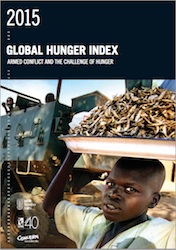 The World Food Prize and Borlaug 101 Dialogues was a place for global leaders to gather and come together to solve the problems of world hunger as well as how to safely and nutritiously feed the growing worldwide population. During the event, the International Food Policy Research Institute, Welthungerhilfe and Concern Worldwide released the 2015 Global Hunger Index (GHI) and found that while the hunger level is down 27 percent since 2000 in the developing world, hunger levels remain “serious” or “alarming” in 52 developing countries. The Central African Republic, Chad, and Zambia had the highest hunger levels in the report.
The World Food Prize and Borlaug 101 Dialogues was a place for global leaders to gather and come together to solve the problems of world hunger as well as how to safely and nutritiously feed the growing worldwide population. During the event, the International Food Policy Research Institute, Welthungerhilfe and Concern Worldwide released the 2015 Global Hunger Index (GHI) and found that while the hunger level is down 27 percent since 2000 in the developing world, hunger levels remain “serious” or “alarming” in 52 developing countries. The Central African Republic, Chad, and Zambia had the highest hunger levels in the report.
The report showed that conflicts can be strongly associated with severe hunger and the reports focal point of interest was armed conflict and the challenge of hunger. The report found the countries with the highest and worst GHI scores tend to be those engaged in or recently emerged from war. The two worst-scoring countries both experienced violent conflict and political instability in recent years. In contrast, in Angola, Ethiopia, and Rwanda, hunger levels have fallen substantially since the end of the civil wars of the 1990s and 2000s.
“War and conquest have long been the drivers of mass starvation. Although humanitarian responses are far faster and more proficient than in the past, we still need to attend to the perils of armed conflict and inhumane policies generating severe hunger,” said Alex de Waal, author of the essay and executive director of the World Peace Foundation and research professor at Tufts University. “The world has enough food, enough logistics, enough knowledge, to end severe hunger: achieving that is a matter of political will only.”
Another focus of the report were areas of success and programs that are working well to end world hunger. The level of hunger in developing countries has fallen by 27 percent since 2000, and 17 countries reduced their hunger scores by at least half since 2000. Among those countries are Azerbaijan, Brazil, Croatia, Mongolia, Peru, and Venezuela. Some of the world’s poorest countries could not be included in the report due to unavailable data. As a result, the picture of global hunger may be worse than reported here.
Global hunger is a continuing challenge with one in nine people worldwide chronically undernourished and more than one quarter of children too short for their age due to nutritional deficiencies. Nearly half of all child deaths under age five are due to malnutrition, which claims the lives of about 3.1 million children per year.

